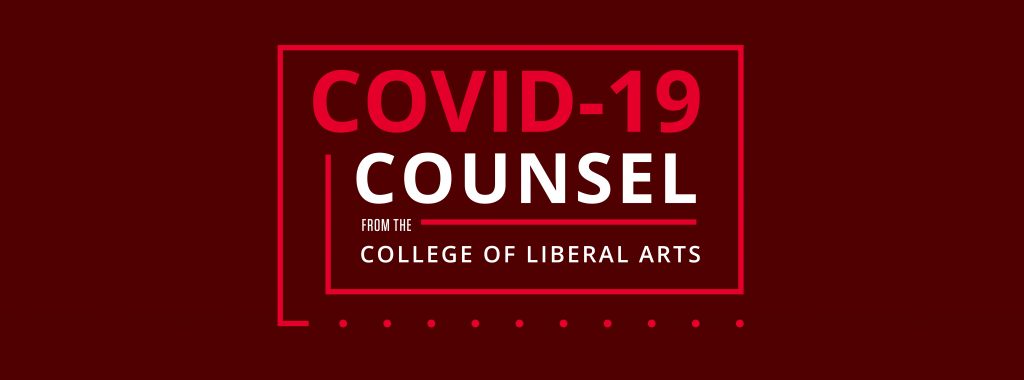COVID-19 Counsel from the College of Liberal Arts
In this new series, we collect various news articles that feature experts from the College of Liberal Arts giving insight into the current global COVID-19 crisis.

Editor’s note: In this new series, we collect various news articles that feature experts from the College of Liberal Arts giving insight into the current global crisis. The purpose of this series is to provide diverse perspectives on various aspects of the COVID-19 pandemic from experts in the college. The series will be shared weekly, so check back for the most up-to-date news.
Opinions | When Trump says he was being ‘sarcastic,’ it’s just part of his gaslighting — MSN / Washington Post
Featuring an op-ed by Jennifer Mercieca, associate professor in the Department of Communication
“As the federal government, state officials and the maker of Lysol spent Friday morning telling Americans that, no, despite what President Trump had said on live television Thursday night, they should not attempt to inject themselves with disinfectants or expose their inner organs to sunlight, the president announced that the whole thing was just a big misunderstanding.
‘I was asking a question sarcastically to reporters like you, just to see what would happen,’ Trump told reporters Friday afternoon. He repeated the word “sarcasm” four times to be sure that reporters would use his framing in their news stories. Trump wanted to make sure that reporters noted that his defense wasn’t that he had erred, but that he was being clever at their expense.”
Read more here.
260,000 Words, Full of Self-Praise, From Trump on the Virus — New York Times
Featuring an op-ed by Jennifer Mercieca, associate professor in the Department of Communication
Viewed simply as a pattern of Mr. Trump’s speech, the self-aggrandizement is singular for an American leader. But his approach is even more extraordinary because he is taking credit and demanding affirmation while he asks people to look beyond themselves and bear considerable hardship to help slow the spread of the virus.
‘He doesn’t speak the language of transcendence, what we have in common,’ said Jennifer Mercieca, a historian of American political rhetoric at Texas A&M University. Instead, Dr. Mercieca said, he falls back on a vocabulary he developed over decades promoting himself and his business.
“Trump’s primary goal is to spread good news and information and market the Trump brand: ‘Trump is great. The Trump brand is great. The Trump presidency is great,’” she said. “It’s not the right time or place to do that.”
Read more here.
Virus is not the only threat to reopening restaurants — The Eagle
Featuring an op-ed by Dennis W. Jansen, professor in the Department of Economics
“However, the most important obstacle to restaurant reopening may be the willingness of their employees to return to work. Laid-off employees likely are receiving state unemployment compensation and, in addition, a hefty additional payment thanks to the overly-generous federal Coronavirus Aid, Relief and Economic Security Act, otherwise known as the CARES Act. The combined payments to the unemployed individuals easily can exceed the pay available to them from working.”
Read more here.
Webinar draws lively global audience seeking “how to be the church” when buildings are closed — World Council of Churches
Featuring Heidi Campbell, professor in the Department of Communication
“As churches have been forced to close their doors and move services online, ‘we are doing it and testing it at the same time,’ said Ingeborg Dybvig, communications director for the Church of Norway. ‘We have seen a lot of different solutions.’
Some of those solutions have been compiled and documented by the webinar’s keynote speaker, Dr Heidi Campbell, professor of Communication at Texas A&M University and director of the Network of New Media, Religion and Digital Culture Studies. Author of the newly released e-book, “The Distanced Church: Doing Church Online in a time of Pandemic,” Campbell said she has been very curious over the last two months to see how churches have adapted and adopted digital technology. ‘We have this unique interactive environment, so how can we leverage that?’ she asked.”
Read more here.
Best States for Working from Home — Wallet Hub
Featuring Stephanie Payne, professor in the Department of Psychological & Brain Sciences
“Unfortunately, crises and emergencies are likely to continue to create the need for working from home on occasion. Correspondingly, organizations may find it in their best interest to keep this option open to their workers. Many organizations have adopted formal telework policies and market this as a family-friendly benefit. Yes, I think that organizations may be more receptive to working from home arrangements (full-time or part-time) after the Coronavirus crisis has ended.”
Read more here.
Read more about COVID-19 from Texas A&M College of Liberal Arts experts here.
